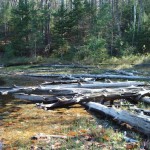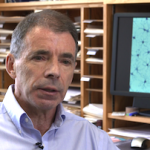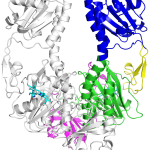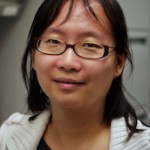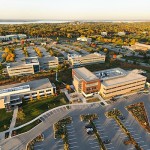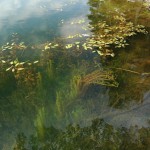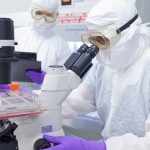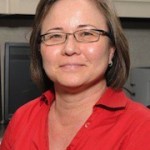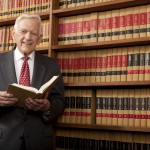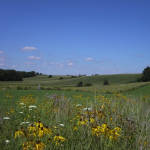Tag Biosciences
Fish forced into the ‘foraging arena’ when lakes lose their trees
In attempts to predict what climate change will mean for life in lakes, scientists have mainly focused on two things: the temperature of the water and the amount of oxygen dissolved in it. But a new study from University of Wisconsin researchers is speaking for the trees - specifically, the dead ones that have toppled into a lake's near shore waters.
Sleep is the price the brain pays for learning
Two leading sleep scientists from the University of Wisconsin School of Medicine and Public Health say that their synaptic homeostasis hypothesis of sleep or “SHY” challenges the theory that sleep strengthens brain connections.
Study identifies gene mutation as cause of canine tremor disorder
Weimaraners – sleek, athletic dogs originally bred for hunting - are known for their striking, silver-tinged coats. Unfortunately, they also are known for a rare tremor disorder reported widely throughout North America and Europe.
UW researchers link protein with breast cancer’s spread to the brain
A cancer-research team at the University of Wisconsin–Madison has identified a protein that may be a major culprit when breast cancer metastasizes to the brain.
CALS researchers developing novel treatment for septic shock
By the time doctors diagnose septic shock, patients often are on a knife’s edge. At that point, for every hour that treatment is delayed, a person’s risk of death rises an alarming six percent.
Documentary connects multiple sclerosis, Vikings and Nordic skiing
Multiple sclerosis (MS), a neurological disease that affects more than 400,000 Americans, attacks the nervous system and causes many symptoms, including difficulty moving. But many who suffer from the disease defy its effects by maintaining an active lifestyle.
Perennial energy crops could provide environmental benefits
Rows of corn and soybeans cover rolling hills, stitched together by creeks and woodlands that compose southwest Wisconsin's agricultural patchwork. These complex landscapes provide clean water, wildlife habitat and climate benefits, yet, historically their value has been measured in just one way: bushels per acre.
New technology could help food crops thrive in crowded fields
With the global population expected to reach 9 billion by 2050, the world's farmers are going to need to produce a lot more food - but without using much more farmland, as the vast majority of the world's arable land is already being used for agriculture.
Discovery sheds light on how changes in lungs can hurt the heart
A team of University of Wisconsin–Madison researchers has discovered important biomechanical changes in human arteries that could increase understanding of how pulmonary hypertension leads to heart failure.
Hyer assumes leadership as University Research Park continues to grow
With last Friday's retirement of longtime University Research Park Director Mark Bugher, associate director Greg Hyer is assuming the role of interim director of the successful, 260-acre park on the West Side of Madison.
Model virus structure shows why there’s no cure for common cold
In a pair of landmark studies that exploit the genetic sequencing of the “missing link” cold virus, rhinovirus C, scientists at the University of Wisconsin–Madison have constructed a three-dimensional model of the pathogen that shows why there is no cure yet for the common cold.
Study challenges prevailing view of invasive species
Zebra mussels. Asian carp. Kudzu. Chances are you recognize these names as belonging to invasive species - plants or animals that are relocated from their native habitat to a foreign land, only to prove so prolific that they take over their new home. Except that's not how the story usually goes, according to a new study.
H5N1 bird flu genes show nature can pick worrisome traits
In a study published today (Oct. 23, 2013) in Nature Communications, an international team of researchers shows how evolution can favor mutations that make avian flu more transmissible in mammals.
Hitchhiking virus confirms saga of ancient human migration
A study of the full genetic code of a common human virus offers a dramatic confirmation of the "out-of-Africa" pattern of human migration, which had previously been documented by anthropologists and studies of the human genome.
Biomanufacturing center takes central role in developing stem-cell therapies
Developing a new drug takes enormous amounts of time, money and skill, but the bar is even higher for a promising stem-cell therapy. Many types of cells derived from these ultra-flexible parent cells are moving toward the market, but the very quality that makes stem cells so valuable also makes them a difficult source of therapeutics.
WARF’s Bremer remembered as technology transfer legend
Sustained by a passion to improve people's lives, Howard Bremer's enduring commitment to innovation fueled his work and his life. Bremer, 90, a WWII U.S. Navy veteran and patent attorney with degrees in law and chemical engineering from the University of Wisconsin–Madison passed away Friday, ending a remarkable career at the Wisconsin Alumni Research Foundation that spanned 53 years.
Marginal land in demand: researchers explore farmer willingness to grow energy crops
In their quest to make cellulosic biofuel a viable energy option, many researchers are looking to marginal lands - those unsuitable for growing food - as potential real estate for bioenergy crops. However, few people have asked: how do farmers feel about using their marginal lands for fuel production?

